|
Given the overwhelming success—I finished and posted it, which counts as success in my book—of my previous entry of the Social Distancing Singles Club and the arrival of six reinforcements from Reckless Records in Chicago and my recent reorganization of my seven boxes of singles and the lack of any specific plans for today or any day in the foreseeable future, I’m having another go at listening to and writing about a tall stack of seven-inch singles in one day. Today the number is twenty-five. As the saying goes, “not all heroes wear capes.” I could wear a cape right now though, I’m sure it would amuse my kids.
Emeralds / Fresh Air, Soundesign, 2009

The Cleveland-based electronic trio Emeralds compiled quite an interesting discography, in which they put five “proper” albums (including the logical starting point for newcomers, 2010’s Does It Look Like I’m Here) and approximately a million supplemental releases (a closet full of cassettes, splits, EPs, and singles) more typical of a noise act. Their set-up—arpeggiated synths, analog synths, and guitar—allowed for plenty of room for exploration, with tracks ranging from concise and melodic songs (“Candy Shoppe”) to driving arpeggiated material (some of the soundtrack to Stranger Things is incredibly close to Emeralds’ territory) to drifting, pastoral soundscapes. And yet I’ve largely stuck with Emeralds’ major releases or its members’ solo works (Mark McGuire’s Get Lost and Steve Hauschildt’s Tragedy and Geometry in particular) without diving into that vast amount of additional material. This single is a toe-dip, but a promising one; the first untitled song is in the melodic vein and a superlative way to start my day, and the flip is less structured but no less inviting.
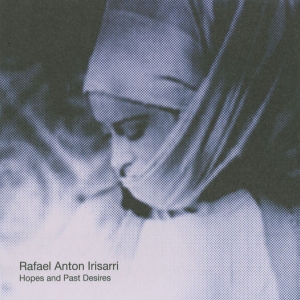
My initial exposure to Rafael Anton Irisarri was through a few of his collaborative ventures: in 2012 he teamed with Benoît Pioulard as Orcas, and “I Saw My Echo” was a showstopper on their self-titled debut (I need to spend more time with 2014’s Yearning), and in 2017 he worked with Julianna Barwick on Thesis 10, a four-song EP that scans very much as “Would you like to hear Julianna Barwick with processed synths behind her vocal loops?” (unsurprisingly, the answer is “yes”). I saw this single as I flipped through Reckless’s digital catalog of seven-inches and ordered both it and his 2019 album, Solastalgia (which appears to need a second pressing). The b-side of the single, “Watching as She Reels,” is particularly great; Irisarri elevates an already compelling combination of muted synths and piano with an extraordinarily affecting cello performance. As you would expect from a ten-year jump in his catalog, Solastalgia occupies a different space, somewhat reminiscent of mid-period Tim Hecker (Harmony in Ultraviolet and An Imaginary Country), but darker and more introspective.
Les Savy Fav / “Hold onto Your Genre” b/w “Meet Me in the Dollar Bin,” Monitor, 2004
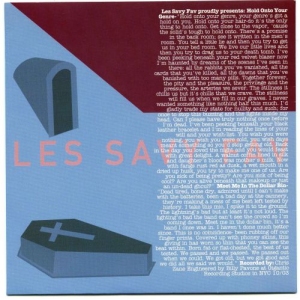
Les Savy Fav evaporated a year or two after their 2010 album Root for Ruin (its songs sounded better live, but don’t they all), with Seth Jabour and Syd Butler joining Girls Against Boys’ Eli Janney in the band for Late Night with Seth Meyers in 2014. (You might think that having those musicians and adding Marnie Stern a few years later would make the show appointment viewing for me, but sleep wins out, time and time again.) They played a couple of shows around the beginning of 2019 and I wondered if anything new would come out of them, but so far, nothing major. Not the best time for a reunion tour, but here’s an idea: put Inches out as a 2LP set. The compilation of nine seven-inch singles originally came out in 2004 as a CD/DVD combo, and featured many of Les Savy Fav’s best songs, including the two on this particular single. It’s true that some of the singles are not hard to come by, but the ones with the best songs, like “We’ll Make a Lover Out of You,” “The Sweat Descends,” and “Meet Me in the Dollar Bin,” are not found in the dollar bin. (I was amused that the sides on my copy of this single were mislabeled, with “Meet Me in the Dollar Bin” playing as the a-side, which is how it should have been anyway.) Reissue this material, throw in the DVD if you so desire, tour when/if the world comes back to normal.
The Karl Hendricks Trio & Mothra / Hooked on Hobbit, Egg Yolk, 1994
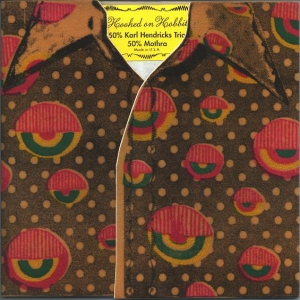
I have plenty of memorably strange seven-inch sleeves, but this split single marked the first time that the record was housed in a fuzzy-textured shirt with a Velcro catch. I’ll buy any vinyl I find from the dearly departed Karl Hendricks, the Pittsburgh indie rocker whose casually scorching leads and humorously confessional lyrics appear on, by my count, nine albums and nine singles, not all of which made it to vinyl. (My personal favorite, 2003’s The Jerks Win Again, was CD-only.) Hendricks also played bass for Damon Che’s Thee Speaking Canaries on The Joy of Wine and Songs for the Terrestrially Challenged, endearingly idiosyncratic and hard-hitting collisions of math-rock and Van Halen cosplay. This particular single is what the kids refer to as a “deep cut,” with Hendricks’ “Catch the Wind” chalking up as a ramshackle, buzzed tale that was smartly kept off of one of his albums. I was previously unfamiliar with Mothra, but judging by their Discogs page, the sleeve design is more in their wheelhouse, with their lone single packaged in red felt and their only full-length album coming in a CD “box.” It would’ve been nice if their sound had been related to the beloved Rodan, but instead it’s fairly nondescript, flanger-heavy indie/alternative rock from the early ’90s.
Pissed Jeans / “Sam Kinison Woman” b/w “L Word,” Sub Pop, 2010

I don’t have a great excuse for taking this long to get into Pissed Jeans (long, unbroken stare after typing that phrase), but my gateway for their sludgy, hardcore-derived rock was the band’s hysterically funny videos for “The Bar Is Low,” “Romanticize Me,” and “Bathroom Laughter.” Some bands have inventively humorous videos and dead-serious music, but Pissed Jeans thrive on the juxtaposition between the stereotypically masculine profile of their music and Matt Corvette’s lyrics, which undercut every angle of such perceived bro-posturing with self-deflating commentary and/or willful stupidity. Case in point is the b-side of this single, “The L Word,” a forceful trudge of a song with the lyrics “Love is a word I use to describe / The way I feel inside / I love this pie / I love a good surprise / I love Velvet Sky / I love the Flyers.” It ruminates on those thoughts for six minutes, although according to this informative Facebook post that dives into the song, somewhere there’s a CD-R with a version that goes on for thirteen minutes. I also ordered a copy of the band’s fourth album, Honeys. Corvette runs a monthly music blog called Yellow Green Red that is an excellent read, support your local blogger.
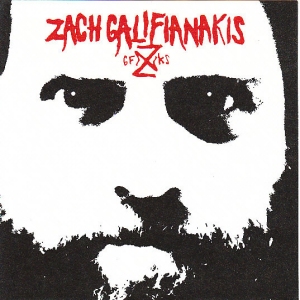
A few years before he broke out in the mainstream with 2009’s The Hangover, Zach Galifianakis released this comedy rap song, which is somehow way, way dumber (and more enjoyable) than even the stock “My name’s So-and-So and I’m here to say / I love rap music in a major way” default. Every aspect of the song is remedial, and yet Fiona Apple appears to drop the hook in the chorus (“If you show me your fanny pack, I’ll show you my fanny”) and the list of call-outs in the outro, returning the favor of Galifianakis appearing in her video for “Not About Love.” (I return to Galifianakis and Will Oldham’s video for Kanye West’s “Can’t Tell Me Nothing” once a year and it always delivers.) Chunklet pressed the song, along with a Best Show-related Ted Leo and the Pharmacists track, on a seven-inch in 2008, and I got the “hardcore” cover edition. Ted Leo’s song on the flip side, “Rock N Roll Dreams’ll Come True,” is an excellent, catchy dose of the power pop you’d expect from Leo, although it’s actually written by Tom Scharpling and Jon Wurster and originally performed by the Gas Station Dogs on WMFU’s The Best Show. Coming after “Up in Them Guts,” it also serves as a necessary mental reset on what music usually sounds like. Fiona Apple sadly does not appear on it.
Paul Newman / ...Please Wait During the Silence, Twistworthy, 1997

Paul Newman was a primarily instrumental band from Austin with two bassists, one of whom named Paul Newman (no, not that Paul Newman), who played a mix of math- and post-rock, with occasional touches of post-hardcore and emo. This 1997 single was their first release and the liner lists their shows to date, all of which were in Texas, only one of which was at a wedding reception. They hadn’t quite found their sound yet—when I learned that a friend once dated Paul Newman of Paul Newman, I asked her if he lived in a chorus pedal factory—and “Clear Baby” goes heavy on the ’90s emo semi-screamed vocals. They released two albums on Trance Syndicate Records, both of which I have on CD somewhere, one album on My Pal God that I own on vinyl, and a final album in 2005 on Emperor Jones that I don’t recall having heard. This particular single was included on a 2001 My Pal God CD compilation of the band’s non-album work called Re-issue! Re-package! Re-package! Re-evaluate the Songs , which also featured “Way to Breathe, No-Breath,” their contribution to a great split single with the band Sonna in which they each played the same song in their respective styles. Drummer Tony Nozero also played in the band Drums and Tuba, bassist Edward Robert is also in I Love You But I’ve Chosen Darkness, and guitarist Craig McCaffrey designed the sleeves for a ton of Kranky Records releases.
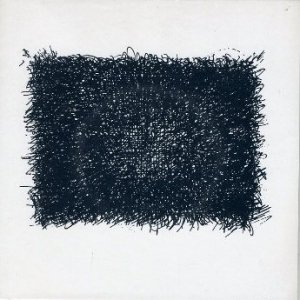
Light / “Turning” b/w “Presence,” Wurlitzer Jukebox, 1995
I was unfamiliar with the UK-based space-rock / drone artist Light until coming across his 1996 LP Turning at Chicago’s Dusty Groove Records a few years ago, but there were enough signifiers that it would be of interest to me (came out on Wurlitzer Jukebox, the cover looks like something from Kranky Records, related to Flying Saucer Attack) that I took a chance and picked it up, finding this single shortly after at Reckless. It’s interesting that “Turning” does not appear on the album Turning, but “Presence” is the better song anyway, reminiscent of Windy & Carl’s drones with an addition of rhythmic textures. He released two other albums and two additional singles, none of which I’m particularly compelled to track down, but would buy on the cheap if I encounter them in a discount bin.
Colin Newman / “B”+ 2, Beggars Banquet, 1980
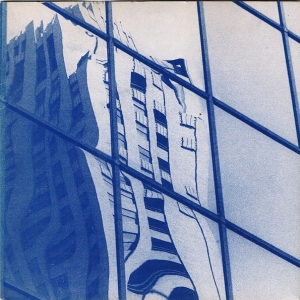
Oh to have been a fly on the wall in a meeting between Beggars Banquet and Colin Newman in 1980 when they were discussing which song to release as the single from his post-Wire solo debut, A–Z. That album is not always easy listening, a trait I suspect was quite intentional, and despite some logical choices in “& Jury” (one of my favorite songs ever), “I’ve Waited Ages,” and “Order for Order,” the album was preceded by “B,” an atonal, if weirdly catch near-instrumental track, interrupted only by wordless screams. Furthermore, it was accompanied by the bizarre video for “B,” which has costumed anti-performances. While I strongly believe the album would have gotten more commercial success if “& Jury” had been the lead single, there’s an interesting trade-off at play. “& Jury” is more straightforward than the rest of A–Z, while “B” tempers expectations for the melodic post-punk that Newman delivered in Wire, framing the album as a standoffish art-rock statement. And while the end result is somewhere in between those two poles, listeners hoping for ten more songs like “& Jury” would have been headed for disappointment. This single features two b-sides: the lurching “The Classic Remains” and “Alone on Piano,” a stripped-down rendering of the haunting track that would later appear in the movie The Silence of the Lambs.
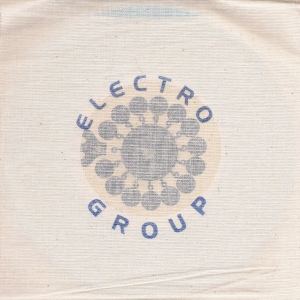
I absolutely bought this single at Parasol Records because of its packaging, which slid marbled blue vinyl into a cloth bag with a button on it. I’d never seen a sleeve quite like it, and the fact that I ultimately enjoyed the music still comes a distant second to “Oh that’s the single with the cloth bag!” in my memory banks. Electro Group hailed from Sacramento and played a heavy form of American shoegaze, reminiscent of the Swirlies, All Natural Lemon and Lime Flavors, Lilys’ In the Presence of Nothing, and of course My Bloody Valentine, with feminine-inflected vocals and more prominent bass than most other groups in the genre. I have their 1998 debut single, “Lifter” b/w “Green Machine,” and their 2000 debut LP, A New Pacifica, on vinyl, but was unaware that they returned in 2017 with the album Ranger. Revisiting “Line of Sight” and “Allstar” (mercifully not the Smashmouth song that haunts me), I’m gently encouraged to spend some time with those other two records in my collection and see how they developed later.
Dot Allison / “Colour Me” b/w “Tomorrow Never Comes,” Sub Pop, 1999
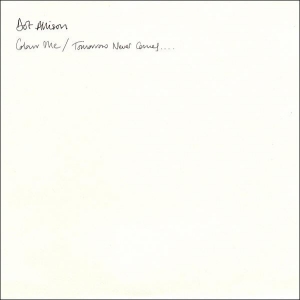
I heard Dot Allison because of Arab Strap’s remix of “Message Personnel” from her 1999 solo debut Afterglow, which stretched the song out to nearly seven minutes with slide guitar and meditative vocal layering. (It was good enough to be included as a bonus track on the regular pressing.) I was unfamiliar with her past in the UK electronic group One Dove, which came up recently when their producer, noted electronic mogul Andrew Weatherall, passed away. As for her solo work, I only know Afterglow (its first two songs are included on this Sub Pop single, perhaps as a way to expand her audience) and its 2002 follow-up, We Are Science, which took a chillier, more explicitly electronic approach to the production (although Mercury Rev apparently helped produce a few tracks). “Colour Me” is closer to what I remember of Afterglow in its late-stage trip-hop trappings, while “Tomorrow Never Comes” is a sometimes compelling, sometimes off-putting combination of bland adult contemporary pop, alt-country, and folk.
Benoît Pioulard / Flocks, Blue Flea, 2009

I recently picked up a different Benoît Pioulard single from Encore Records and had a conversation about the Michigan native’s catalog, which is ever-expanding and a touch overwhelming. His 2006 debut Précis was one of my favorite albums from that year, a surprisingly melodic combination of hushed folk, slow-core indie rock, and texturally rich post-rock. I initially tried keeping up with his output, but like Emeralds, there’s an a-path of major releases and a b-path of minor releases, and I found myself lagging behind by 2010’s Lasted. He keeps releasing albums, I keep hearing about them and thinking “I should check that out,” but two things typically diminish my momentum. First, the hooks of Précis don’t pop up often enough; second, I always suspect I’m missing out on the release that would properly pull me back in. Adding to this conundrum is how, when I have picked up a single like Flocks (which I fittingly got at Stormy Records a few years ago, given that it was released on Windy & Carl’s label Blue Flea), I’m happy to revisit his sound. Half of Flocks is more structured than some of his later full-lengths, with the a-side “Maginot” offering both a nice vocal melody and a neat harmonic line before its droning outro, while the b-side “Alaskan Lashes” is a formless instrumental. More of the former, please.
Sonna / “Kept Luminesce” b/w “Mirameko,” Static Caravan, 2000
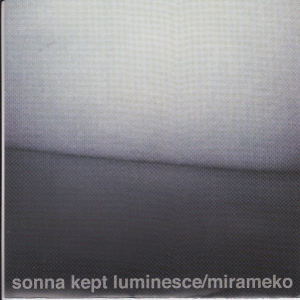
Sonna was a Baltimore-based post-rock band, whose members included guitarist Jeremy DeVine (the proprietor of Temporary Residence Limited, the label which released most of the band’s music) and drummer Jim Redd (who later joined Tarentel). I don’t know if I first heard them from their split single with Paul Newman, on which they performed a slower, lush take on “Way to Breathe, No-Breath,” or their 1999 EP These Windows Are Pistons (the opening song of which is tremendously evocative of lightly falling snow), but I later picked up their 2001 LP We Sing Loud Sing Soft Tonight and this single. “Kept Luminesce” is halfway between a crescendo-free post-rock song and the lighter pop touches of The Sea and Cake, with the vocals residing in Sam Prekop’s restrained register as the drums shuffle briskly underneath. “Mirameko” is an instrumental with intertwined, mostly clean guitar lines, masticating on melodic phrases. It wasn’t long after I picked up and enjoyed this single that Temporary Residence included it on the 2016 non-album material compilation Keep It Together.
Jud Jud / X The Demos X, No Idea, 1997/2007
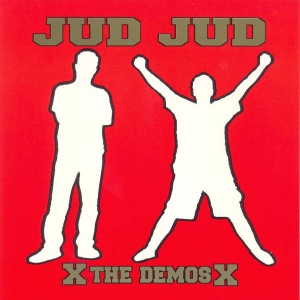
Two anecdotes about this single from storied a cappella hardcore duo Jud Jud: First, if you’re a new visitor to my house and you are unfamiliar with the storied a cappella hardcore duo Jud Jud (and not an elderly relative), there is exceptionally strong chance that I will play the entirety of this single before you leave. Look, that’s the deal. Second, when I moved from Massachusetts to Michigan last summer, I did that drive three times in a little over a week and a half (drove sixteen-foot rental truck, flew back, drove my car and the pets, flew back, drove my wife’s car). In order to maintain consciousness / sanity while driving, I made an extraordinarily long playlist to put on shuffle. At the time I meant to write about that experience and that playlist, but in hindsight, I was too busy driving from Massachusetts to Michigan to write about what music I listened to while driving from Massachusetts to Michigan. The biggest take-away from the playlist was clear, though. Any time that a Jud Jud song came up, it brightened my mood. Just a sheer delight to be driving through western New York and have “X Rounds of Jud Song X” come on.
Season to Risk / “Mine Eyes” b/w “Why See Straight,” Columbia, 1993
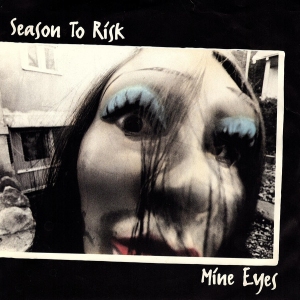
Allen Epley of Shiner / The Life and Times has a podcast called Third Gear Scratch in which he talks with artists (primarily musicians) about their work and lives, and one of the more interesting episodes for me was his talk with Steve Tulipana of Season to Risk. Not only because it addressed how Shiner essentially used Season to Risk as a farm team for new members (most notably Paul Malinowski and Tim Dow, but Josh Newton and Jason Gerkin also played in S2R), a point of discussion which was more cordial than expected, but also because Season to Risk is one of the more baffling acts to get a major-label deal. They are not, to say the least, listener-friendly. Their 1993 self-titled debut, on which both of these songs appear, nudges the grinding, atonal rock of The Jesus Lizard and Helmet a step closer to Headbanger’s Ball, but as much as Epley enjoyed doing the “Mine Eyes” vocal on the podcast, they are not a particularly catchy band. Their sophomore record, 1995’s In a Perfect World, is merciless and pummeling to a degree that few records in my collection match, and it’s exponentially more interesting to me than their debut. Absolute commercial suicide, though. I haven’t played Men Are Monkeys. Robots Win. or The Shattering in ages, but I recall them having at least a few shreds of melody in the mix.
Bob Mould / “Classifieds” b/w “Moving Trucks,” Creation, 1998
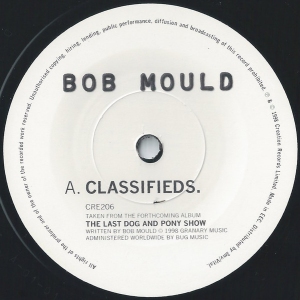
I saw Bob Mould for the first time last fall when he played at The Ark in Ann Arbor, and in advance of the show, I read his autobiography, See a Little Light: The Trail of Rage and Melody and did a little catch-up on his more recent solo work. The book was a mostly compelling look into his upbringing, the formation of Hüsker Dü, his interpersonal disagreements with various band members, his long-term relationships, and the gradual evolution of his personality (when it happened, Bob Mould Club DJ and Electronic Artist was a surprise, but there was a build-up to it in his life). The show was solid: he played a lot of his newer solo stuff, some Hüsker Dü material, a scant few Sugar songs; his signature guitar tone was largely at odds with the vaunted acoustics of the venue; it was nice to be one of the younger audience members for once. The solo album which sourced this double a-side single was 1998’s The Last Dog and Pony Show, which at the time was promised to be his final guitar album (Narrator: “It was not”). At the time I loved Sugar’s catalog but hadn’t heard any of Mould’s prior solo work, and in hindsight, that’s probably for the best, since this was his most direct line back to Sugar at the time. These two songs, along with “New #1” and “Skintrade,” were the highlights of the album.
At the Drive-In & Burning Airlines / “Catacomb” b/w “The Deluxe War Baby,” Thick, 2000
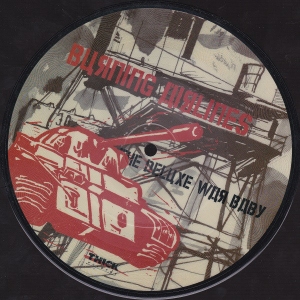
Thick Records was a Chicago-based independent label that put out a lot of picture-disc seven-inches, typically skewing more punk than my usual tastes. I picked up a handful of these singles over the years (Edsel’s “Perched Like a Parasite” is the next one that comes to mind), but none were quite as anticipated as this Burning Airlines / At the Drive-In single from 2000. At the time, Burning Airlines had put out the front-to-back great Mission: Control!, and (if memory serves) ATDI hadn’t yet released Relationship of Command, which would follow later in the year. I was, and still am, far more interested in Burning Airlines’ “The Deluxe War Baby” than At the Drive-In’s “Catacomb,” even though the hype for ATDI at the time was overwhelming. (I remember a friend writing a glowing review of In/Casino/Out for my online magazine Signal Drench.) “The Deluxe War Baby” reappeared on 2001’s Identikit, where its vaguely country-ish lead still thrilled, while ATDI re-recorded their song as "Catacombs" as a Japanese bonus track for Relationship of Command. When At the Drive-In blew up, I assumed this single would be hard to come by in the future, but copies remain relatively inexpensive.
Füxa & Bright / “City & Metro” b/w “How I Reached Home,” Darla, 1997
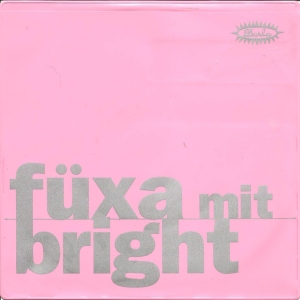
This split single features two aesthetically dissimilar artists from the Darla Records stable. The two-piece Füxa hails from Detroit, playing experimental, mostly electronic music that exists somewhere between Stereolab’s retro-futurism, Windy & Carl’s pastoral drones, and Spacemen 3’s narcotic psych-rock. I have a couple of other scattered releases from their considerable discography, most notably their entry into Darla’s Bliss Out series (1997’s Venoy). Their contribution here, “City and Metro,” starts off like an instrumental Stereolab outtake, and then moves into darker noise in its second half. The Emeralds of the ’90s? Bright was a guitar-rock band from Brooklyn, channeling some amount of Kraut-rock in their hypnotic approach to repetition. They also made a Bliss Out record, Blue Christian in 1997, but aside from another single of theirs that I have (which is in a blue poly sleeve, as opposed to the pink one found here), I’ve spent the most time with their 2005 swan song Bells Break Their Towers, which has a couple of extended, ten-plus-minute-long tracks that leaned into their best tendencies. Their leader, Mark Dwinell, is now a member of the Kranky Records band Forma, whom I had already meant to check out and now will actually check out.
Shannon Wright / “A Tin Crown for the Social Bash” b/w “You're the Cup,” All City Hobo, 1998
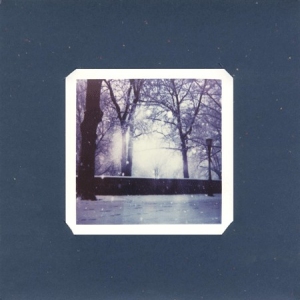
I finally got to see Shannon Wright perform a few years ago when she opened up for Shellac in Providence. Her tours, along with her vinyl releases, primarily occur in Europe these days, and I’m not sure if that trend started before or after her 2004 collaborative record with French musician / composer Yann Tiersen, but it’s a shame American audiences don’t appreciate her more. Her evolution from the nondescript indie rock of her ’90s band Crowsdell (I have a few of their releases and they’ve never registered) to the slightly askew acoustic compositions of her earliest solo days (which include these songs) to the increasingly intense and experimental Days of Tacit and Dyed in the Wool to the alternately thrashing and delicate Over the Sun was a tremendous arc, and I would be making a huge mistake to dismiss her more recent work as less essential. (One of my record store regrets is passing on the original vinyl pressing of 2007’s Let in the Light in a store in Milan, in hindsight that was the obvious place to get it.) Last year I picked up a copy of her solo debut Flightsafety on vinyl and two thoughts prevailed from a recent spin: first, the opening “Floor Pile” remains astounding, one of her best songs; second, hearing the word “quarantine” repeating a ton in “Captain of Quarantine” has taken a decidedly different resonance.
Boy's Life & Giants Chair / “Worn Thin” b/w “Ever Present,” HitIt!, 1995
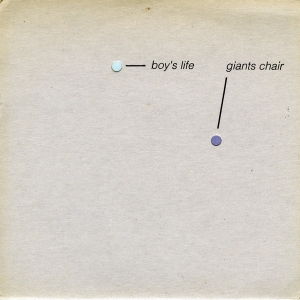
This split single is a battle of the “Is there an apostrophe in this name or what?” bands, and the fact that Boys Life appear on this single as “Boy’s Life” and as “Boys Life” on all of their other official releases causes me no small amount of consternation. They win the battle, not through the apostrophe-insertion trickery, but by virtue of “Worn Thin” possessing greater dynamic range than Giants Chair’s “Ever Present.” (Important note: the Shiner song on Starless is called “Giant’s Chair,” with an apostrophe.) Their command of the transitions between intense, tricky Midwestern rock and cavernous empty space is the most striking aspect of their 1996 LP Departures and Landfalls (reissued on vinyl by Topshelf in 2015), and you get enough of a taste of it here. “Ever Present” is a solid, gear-churning Giants Chair song, just not quite up to the nod-inducing “Single File Accident” from 1996’s Purity and Control. Giants Chair got back together in the last few years and put out Prefabylon last year, which I will listen to at some point, I swear.
Girls Against Boys & Stanton-Miranda / “She's Lost Control” b/w “Love Will Tear Us Apart,” Virgin, 1995
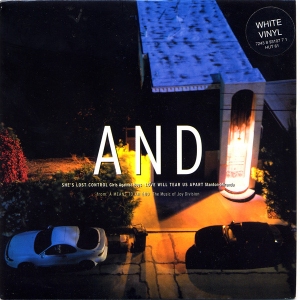
I heard Girls Against Boys’ cover of Joy Division’s “She’s Lost Control” in roughly the same time-frame as the original, having picked up both A Means to an End: The Music of Joy Division (the tribute compilation on which both sides of this single appear) and Permanent (Joy Division’s 1995 greatest-hits compilation) midway through high school. As far as applying your own aesthetic to a cover, GVSB’s “She’s Lost Control” is a triumph, beefing up the clicking rhythm section of the original with the group’s signature two-bass assault and Alexis Fleisig’s pummeling drums. (Said it before, will say it again: he’s one of the most underrated drummers.) I won’t deny that it loses some of the haunting resonance of the original, but it’s a different take. Stanton-Miranda’s cover of “Love Will Tear Us Apart” is less successful, as her smoothly melodic vocals disarm the composition of its tension. I recently saw Stanton-Miranda’s name in the credits for Jonathan Demme’s Something Wild (The Feelies play a high school reunion!) and learned that she also had a tiny part in The Silence of the Lambs.
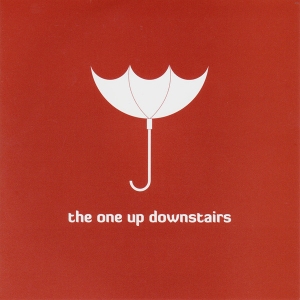
I was unaware of this pre-American Football band when I lived in Champaign from 1999 through 2005, learning of it when Polyvinyl unearthed these recordings in 2009. Mike Kinsella and Steve Lamos’s involvement are less interesting to me than the other half of the group, David and Allen Johnson, who then formed Very Secretary with former Braid drummer Roy Ewing and violinist Rachael Dietkus (both of whom were also in the short-lived Days in December with Castor’s Jeff Garber). Given all this crossover, the existence of another scrambling of familiar names did not come as much of a surprise to me, nor did the actual music. It sounds like a halfway point between the mannered indie rock of Very Secretary’s 1999 debut Best Possible Souvenir and the carefully arranged emo of American Football. It’s not as good as either of those bands, but hey, it exists. Mike Kinsella only singing while David Johnson played guitar is interesting, however, since after Very Secretary broke up, I heard that Johnson no longer wanted to sing, and instead wanted to bring a different singer (supposedly Compound Red’s Greg Steffke) into the group.
The Most Secret Method / Blue, Self-Released, 1996
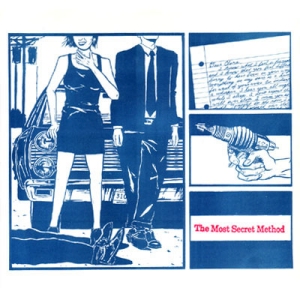
The Most Secret Method were one of DC’s best-kept secrets, with their debut LP, 1998’s Get Lovely (issued by Slowdime), ranking among the finest albums from that era of the scene. They put out a second album in 2002 called Our Success and called it quits, leaving drummer Ryan Nelson to join plenty of other bands. Deep breath: He was in Beauty Pill for a while and contributed the ecstatic title track to the You Are Right to Be Afraid EP [now his wife, Erin Nelson, is in Beauty Pill]; he formed Soccer Team with Melissa Quinley, and their 2015 album Real Lessons in Cynicism was quietly wonderful; he was in the Kalamazoo band Minutes, who pressed too few copies of their fire-spitting records; he was in Routineers, who released one CD and I’ve never heard of them before this instant. As evidenced by the cover of this single and most of his other bands’ albums, he’s also a striking visual artist. They self-released this debut seven-inch, and while they improved considerably by Get Lovely, there’s still plenty here on both the driving DC post-punk song “Blue” and the bass-led instrumental “Perfect Plan” to keep listeners’ attention.
Rex / “All” b/w “Nayramadin Orgil,” Southern, 1995
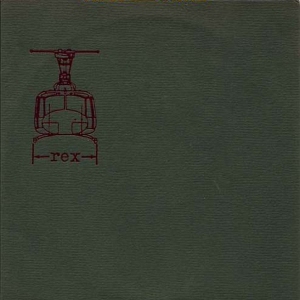
Another mid-’90s indie band that has fallen out of the discourse, Rex was an interesting combination of various trends of that time: slow-core (they featured Codeine’s drummer Doug Scharin), Oldham-esque indie folk/country (particularly in their instrumentation), and post-rock. They released three full-length albums, one EP, and three singles, but I first and foremost remember them for the lead track on their 1995 self-titled debut LP. “Nothing Is Most Honourable Than You” is a back-porch dirge with rickety production, a devastating cello line, wounded vocals, and a still-surprising guitar solo. I would be lying if I said anything else in their catalog meant as much to me as that song, even their second album, 1997’s C, which is better written, better performed, and better produced. This single also came out in 1995, and I don’t know if it preceded the album or not, but there’s a greater degree of clarity to the recordings here. Both songs are nice if somewhat inconsequential, “All” is a pleasant, late-night ode, while “Nayramadin Orgil” is an instrumental that eventually features a mouth harp.
Loscil / Sine Studies 1, Jaz, 2013
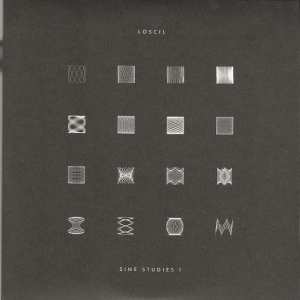
Loscil is one of the few Kranky Records mainstays who has eluded my obsession. I’ve tried to get into several of his full-lengths, but found his brand of ambient to be slightly too cold, too electronic for my tastes. I saw him open for A Winged Victory for the Sullen at T.T. The Bear’s Place in Cambridge (RIP) and enjoyed zoning out during his set but wasn’t emotionally invested like I was during AWVFTS. This single is the only Loscil release that I own, and I distinctly recall picking it up at Aquarius Records in San Francisco (RIP). It’s technically impressive—a smart pairing of deep bass notes and sine wave melodies—but my mental picture involves standing in a temperature-controlled, fluorescent-lit room, watching LED lights flicker on servers.
|

Unlike some of their similarly reformed ’90s indie rock peers, Girls Against Boys (the unfamiliar should consult my primer) aren’t returning from the hard stop of an acrimonious break-up. Their decade of relative inactivity since the Jade Tree–issued You Can’t Fight What You Can’t See was still marked by the occasional live appearance—specifically, the Touch and Go 25th Anniversary Block Party, All Tomorrow’s Parties’ Don’t Look Back, ATP vs. Pitchfork, and a 2009 European tour; generally speaking, anywhere I was not living at the time. Their 3X bass expansion unit could still boot up when called upon, but as a fully functioning machine, GVSB had gone into standby. I’d have to subsist on their consistently excellent discography, particularly their trio of superlative LPs on Touch and Go, and cross my fingers that one of these appearances would be in my time zone.
Three surprises greeted me in 2013: first, Girls Against Boys announced a brief East Coast tour, including a stop at Great Scott in Allston; second, a pairing forged at the Absolutely Free Festival in Belgium made its way to the American bills as well, with The Jesus Lizard’s David Yow accompanying GVSB for part of their set; third, The Ghost List EP was announced for a fall release on Epitonic. Of the three, new material was the stunner. (David Yow keeping it in his pants was a close second.) It’s one thing to issue an EP after a decade of heavy touring, but with only sporadic events on their calendar, Girls Against Boys weren’t the likeliest candidates to present new songs.
Not that I’m arguing with this development. Similar to Superchunk’s post-hiatus records, Girls Against Boys slip comfortably back into their trademark sound on The Ghost List. Its five tracks occupy terrain between the well-oiled machinery of House of GVSB and the up-front melodies of You Can’t Fight…, constructing a veritable bridge over the questionable production values of Freak*on*ica. Despite being assembled from a mix of half-finished song sketches and newly authored tracks, The Ghost List doesn’t prompt a round of when-was-this-song-written like My Bloody Valentine’s M B V.
With only five songs spanning eighteen minutes, The Ghost List wisely avoids filler. Opener “It's a Diamond Life” struts with distorted keyboards and emphatic Eli Janney background vocals while Scott McCloud glares at both one-percenters (“It's a crystal system”) and those overeager to join them (“I don't know what I want / But I want it a lot”). “Fade Out” accelerates from trot to gallop on its chorus, flying by in a scant 2:20. The subtly meta-critical “60 > 15” ("I've heard your volume kills / I’ve seen your psychic thrills") confirms GVSB's rhythm section's continued ownership over mid-tempo pummeling. Despite GVSB’s ongoing emphasis on rhythm, “Let's Get Killed” offers one of their clearest melodies to date, on par with the highlights of You Can't Fight... and “One Dose of Truth” from the Series 7 soundtrack. Finally, “Kick” recalls the genuine malice lurking on Girls Against Boys' mid-period classics. Its orchestral stabs are a successful new addition to their repertoire, even though the EP’s emphasis on trademark-renewal didn’t mandate a step forward.
Here's the only drawback: The Ghost List proves Girls Against Boys can hold their own as a fully reunited band in a modern context, but it doesn't necessarily dictate that they will. The geographical and logistical hurdles that prompted their decade layoff from recording still exist: Scott McCloud lives in Vienna and focuses on the comparatively chill Paramount Styles, Eli Janney is a NYC-based recording engineer/podcast host, Johnny Temple has his hands full with Akashic Books, and Alexis Fleisig drums for three other bands (Paramount Styles, Obits, and Bellini). Maybe a full catalog reissue like Numero's exhaustive Unwound box sets would prompt an overdue critical reappraisal (“Yes, indie rockers did have sex in the 1990s”), further touring, and more material, but the roulette wheel of vinyl reissues could instead land on more stealthy repressings from Touch and Go. I’d prefer the former, obviously, but The Ghost List would stand as a worthy final chapter if Girls Against Boys go back into standby.
|
56. Dr. Billy James Hargis - The United Nations Hoax - Key Records, 1962
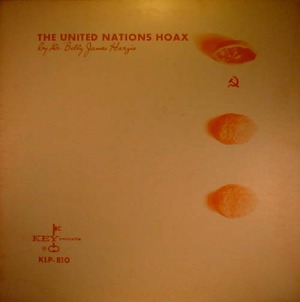
Why I Bought It: There’s really no doubt as to what will be on this LP—anti-communist rhetoric, check—and the cover is vague enough to be foreboding, so there goes a dollar. I didn’t know who Dr. Billy James Hargis was when I bought it, but it’s hardly a surprise that “the world’s leading anti-communist evangelist” was also one of the founders of the Religious Right. If nothing else, this record could be filed away with a number of other “Party’s over, folks, let’s get out of here” curiosities.
Verdict: This “fact-packed album” (thanks, Matt Cvetic, former FBI counterspy and liner-note scribe) is just as infuriating as I expected. Hargis, as paraphrased so effectively by Cvetic, argues that the United Nations is a “Soviet-controlled predatory monster—housed, clothed, and fed by those it plans to consume... the American people!” This alarmism isn’t backed up by anything other than basic facts about the constituency of the United Nations at the time, so he’s not rolling out evidence of damning policy change. I’m tempted to type out the liner notes, since they’re loaded with overblown rhetoric, but I’m sure you get the drift. I admittedly only listened to one side of this LP, which is against my usual “suffer through all of it” policy, but it’s not like Hargis is likely to save his hottest tracks for the flip.
I’m sure this issue will come up again with a few more novelty LPs, but political rantings like The United Nations Hoax no longer garner vinyl pressings thanks to the rise of television (FoxNews), the internet, and specifically podcasts. It would be rather amusing if Keith Olbermann took advantage of the recent resurgence in vinyl (and the liberal leaning I presume accompanies it) by releasing a gatefold pressing of his special comments. Maybe Ben Affleck could write the liner notes.
57. New Wet Kojak - Extended Tongue and Miramax - Akashic, 1997
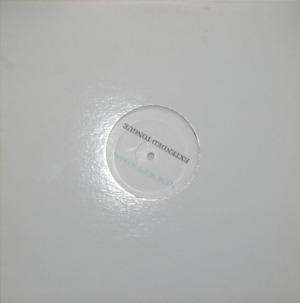
Why I Bought It: My rabid Girls Against Boys fandom was coming to a fever pitch around the time of New Wet Kojak’s second LP, 1997’s Nasty International. The Touch and Go catalog called it “4:00 am basement lounge,” which is an astonishingly accurate assessment of the music’s creation and its designated listening environment. Subtract GVSB’s rhythmic drive, add some skronking horns, turn Scott McCloud’s vocals down to backroom whispers, and you have a New Wet Kojak song. It’s a self-indulgent mess, but hey, it’s a side project.
Their self-titled debut was decidedly half-baked, but Nasty International felt almost like a real album, if not a particularly memorable one. Switching between leering, mid-tempo rock songs and slow-grind ballads, Scott McCloud and Johnny Temple found a new formula to exploit. Following GVSB’s disappointing major label debut, the grossly over-produced Freak*on*ica, New Wet Kojak’s next album, 2000’s Do Things, perfected McCloud’s late-night come-ons and sloganeering. Sometimes it sounded great (4:00 am), sometimes I was embarrassed to listen to it (daytime), sometimes lines like “Don’t miss sexy fun! Do things!” became ironic catch phrases during road trips, but it felt like a real band. Too much like a real band, in fact.
By this point, Girls Against Boys was frustrated by the aftermath of their Geffen deal and slowing down their pace. They did a few soundtracks (the New Order-esque “One Dose of Truth” from the Series 7 OST being the overwhelming highlight) and came back to the independent life with 2002’s Jade Tree outing You Can’t Fight What You Can’t See, a nice return to formula, but the writing was on the wall. Underlining that writing was how professional New Wet Kojak’s next two releases sounded, the 2001 No. 4 EP and the 2003 This Is the Glamorous LP. No longer did the group evoke “4:00 am basement lounge.” It was a strange, unbecoming evolution, since the more New Wet Kojak tried to rock, the more I longed for GVSB.
GVSB’s been on permanent hiatus since 2003, coming out of hiding only to perform a few key gigs. New Wet Kojak must’ve suffered the same fate shortly thereafter, but I simply never cared enough to note their demise.
This particular LP is a fine document of that malaise. A limited edition 12” with extended cuts of two New Wet Kojak songs should be marked directly to a GVSB fanboy like myself, but I waited until Reckless marked it down to a few bucks before grabbing it. By that point, New Wet Kojak had gone professional and I’d stopped listening to their earlier records, so this LP was filed away with my other completionist urges.
Verdict: I should have been wary of the word “extended” in the loose world of New Wet Kojak. “Stick Out Your Tongue” already earned an aimless, unnecessary remix on New Wet Kojak, but the group found it prudent to release an interminable cut of this remix on this EP. I don’t view this song as a remix, however, since it’s too organic to sound like anything other than “Tape’s rolling, let’s fuck around before we leave for breakfast.” Nasty International’s uninteresting minute-long snippet “Miramax #1” is dragged out over the entire flipside at 33 rpm. There’s a brief moment when a sampled female vocal fits with the ramshackle groove in a compelling way, but they ruin it within seconds. Any critic citing New Wet Kojak as one of the most embarrassing side projects in recent memory has ample evidence here. These extended cuts make their first few records seem enticingly focused in comparison, but also gave me enough New Wet Kojak to last for a few years. I’ll stick with Girls Against Boys, thanks.
58. Cheap Trick - Dream Police - Epic, 1979
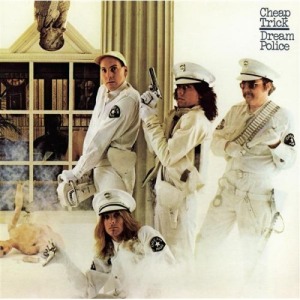
Why I Bought It: The first ten seconds of “Dream Police.” I must’ve seen this LP fifty times before “The dream police they live inside of my head” finally convinced me to drop a dollar on this Cheap Trick LP. Too bad “Surrender” and “I Want You to Want Me” aren’t on this record.
Verdict: I honestly can’t recall if I’d ever heard the entirety of “Dream Police” the song, but Dream Police the album is overblown in the biggest, most ’70s ways possible, whether it’s in synthesizer/string flourishes or epic track lengths. “Gonna Raise Hell” drags on for a seemingly interminable 9:20! The otherwise solid “Need Your Love” carries on for 7:20! I expected more of a power-pop feel to the record, but only “Dream Police,” “Voices,” and “Need Your Love” deliver. The other songs suffer from forced aggression (“This House Is Rockin’ [With Domestic Problems]”), too much soloing, and/or a lack of humor, which surprised me given “Surrender.” Hardly a surprise, then, that Dream Police is usually regarded as a drop-off in quality after their first three releases.
59. Terje Rypdal - Waves - ECM, 1978

Why I Bought It: I decided to take a chance on a completely unfamiliar ECM title and artist because it was a dollar and I’d been listening to a lot of Steve Reich’s ECM recordings at the time. I never thought, “This album is going to be just like Music for 18 Musicians,” nor did I have a strong sense of what it would sound like. Understandably, it took me a while to muster up the gumption to give this album a listen, but this excellent article from Perfect Sound Forever gave me a much better sense of what to expect from Waves and how it fit into Rypdal’s catalog.
Verdict: Trying to get a handle on Rypdal’s style, even with that article in mind, is a difficult process. Opener “Per Ulv” combines bop jazz and prog-rock guitar, sounding a bit like Santana joining a jazz trio onstage. Closer “Charisma” drops most of the jazz overtones, merging prog explorations and the atmospheric spaces of Tangerine Dream for the first song that sounds stereotypically Nordic. Most songs are dominated by trumpeter Palle Mikkelborg rather than guitarist/keyboardist Rypdal, which keeps things on the jazz side of the equation more often than not, but the compositions splay out like 1970s prog. The key word for Waves is “intriguing,” since I even as the record progressed I never got a handle on what to expect next.
60. Nitzer Ebb - That Total Age - Mute, 1987
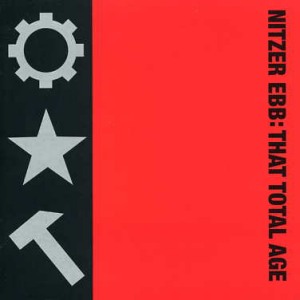
Why I Bought It: I knew that Nitzer Ebb fit into the late 1980s and early 1990s industrial scene, presumably from my bathroom reading sessions of The Trouser Press Guide to 1990s Rock. I’d gone through a brief and by no means comprehensive industrial phase my freshman year of high school prompted by Killing Joke’s Pandemonium and Nine Inch Nails’ Nothing Records, but my fondness for the genre expired before I did any major backwards exploration. When I stumbled across a number of 1980s industrial LPs in the dollar bin, including Nitzer Ebb, Skinny Puppy, and Einstürzende Neubauten, I snapped them all up, intending to fill the gaps in my 1994-1995 listening pile. I even had a decent idea of what to expect from each artist—electronic-heavy, somewhat pop industrial from Nitzer Ebb; abrasive and aggressive industrial from Skinny Puppy, and actual industrial sounds from Neubauten. I say actual since so much industrial ends up sounding like mean, heavy synth-rock. Nine Inch Nails’ Pretty Hate Machine broke in the mainstream because it was ostensibly mean, heavy synth-pop. It makes sense to start with Nitzer Ebb, since they’re closest to my industrial experience, but those Skinny Puppy and Einstürzende Neubauten LPs will come up later in RCR.
Verdict: That Total Age punishes the listener with a minimal combination of electronic beats, repeated phrases, and up-front bass for maximum damage. Wikipedia informs me of an industrial sub-genre called electronic body music, which isn’t far off from my initial take on songs like “Fitness to Purpose” and “Let Your Body Learn”: an S&M fetishist drill sergeant remaking Olivia Newton John’s “Physical.” A few of the songs diverge from the murderous repetition, paying off my pop expectations, but most chug along with endlessly repeated shouted slogans. At one point I thought “It’s like an entire record of extended 12” takes!” but only the aptly titled “Join the Chant” goes past six minutes. By the end of That Total Age I was exhausted from Douglas McCarthy’s barked vocals, so a single 12” EP might’ve been a better pick-up. Nitzer Ebb confirmed by expectations, sure, but they also underscored why Nine Inch Nails needed to incorporate more traditional synth-pop hooks and structures to cross over.
|

My two favorite groups in high school, Hum and Girls Against Boys, represented a vast stylistic divide in 1990s alternative rock. Hum’s space-rock gazes longingly at the stars; Girls Against Boys’ bass-driven post-punk aims straight for the gut (if not lower). Hum represented the Midwest’s particular brand of introspective guitar rock; Girls Against Boys pulled a lineage of DC punk and hardcore into the postmodern affectations of New York City. Whereas Hum’s lyrical depth and emotional resonance appealed to the core principles of my musical tastes at the time, Girls Against Boys felt like the exception to those rules.
Substance? Girls Against Boys’ style is their substance. Unlike so many other groups dependent upon style, GVSB subvert any noticeable rock clichés through equal doses of brute force, postmodern ironic detachment, and electrifying urgency. Scott McCloud’s raspy charisma winks at any lyric that’s too neat, any setting that’s too clean. Out of context—hell, often in context—individual lyrics sound like mistranslated non sequiturs, come-ons from lounge crooner wannabes, or slurred threats from the menacing guy at the end of the bar. Yet somehow they make perfect sense in the moment of McCloud’s delivery, drawing you into the group’s precise, bass-heavy throb.

There are a few other notable two-bass line-ups from the 1990s—Ned’s Atomic Dustbin’s Grebo Brit-rock, Dianogah’s bass-only instrumentals, Ganger’s Krautrock-influenced post-rock—but Girls Against Boys’ post-hardcore style gels perfectly with Johnny Temple and Eli Janney’s low-end thrusts. Janney alternates between a sampler keyboard and his custom metal bass, and in both situations, his lines add melody and depth to Temple’s solid foundation. Alexis Fleisig’s floor-tom-heavy drumming combines equal parts power and precision, throttling each fill without going overboard or detracting from the group’s focus. It’s rare that a group’s guitarist can be overshadowed by its rhythm section, but McCloud made due, adding texture to the top of the mix, ducking into the lower registers for bonus rumble, and strafing the bassists with razor-wire riffs. Math-rock time-signature fetishists look elsewhere; Girls Against Boys songs locked into their savage grooves and pummeled them into submission.
Many critics now herald Girls Against Boys’ 1993 LP Venus Luxure #1 Baby as a classic of 1990s indie/alternative rock and dismiss the rest of their catalog as dry runs or pale imitation. I can’t disagree with the first part—Venus Luxure is their best record by a fair margin and among my top ten albums of the decade—what propelled me into obsession was the depth of GVSB’s catalog. Sure, their first two releases showed growing pains and Freak*on*ica was a major-label disaster, but even those albums have their rewards. Their Touch and Go years were remarkably fruitful for LPs, EPs, and singles. I’ve chosen to select songs from each major release and a few additional highlights, which means Venus Luxure and its Touch and Go brethren are sorely underrepresented, but you should go out and buy those three albums if you don’t already own them. I’ve included MP3s for the rarer material and YouTube links whenever possible.

“Stay in the Car” – For the start of the group and the Eighties half of this EP, DC-area producer Eli Janney joined Fugazi drummer Brendan Canty and Soulside singer Scott McCloud for some regrettable synth-/sample-heavy industrial post-punk. I view the Nineties half of this EP as the group’s true beginning, since Girls Against Boys immediately hit their stride once McCloud’s former Soulside band mates, drummer Alexis Fleisig and bassist Johnny Temple, joined the fold. “Stay in the Car” starts off with Janney’s shuddering sampler bass, but soon enough Fleisig’s forceful, swinging beat, Temple’s deep bass line, and Scott McCloud’s howling guitar create the first signature GVSB groove. The vague lyrics—“Step one / Stay in the car,” “A pat on the back from the president,” “We need some gun control / We need the Marlboro Man”—might not sound like much on paper, but combined with the group’s locked-down rhythmic drive, these stray phrases evoke an urgent, action movie dreamscape.

“Matching Wits with Flaming Frank” – Girls Against Boys reconvened for their 1992 debut LP, Tropic of Scorpio, but like its EP predecessor, it’s a mixed affair. Between lounge-flavored songs like the “Everything I Do Seems to Cost Me $20” and the noisy experimentation of “Plush,” there’s a lack of focus and consistency antithetical to their Touch and Go output, even if they’re intriguing diversions. Thankfully, the first three songs bridge the gap between this loose approach and the intensity of their later work. “Matching Wits with Flaming Frank” isn’t as dynamic as “My Night of Pleasure (with the Mudjacking Contractors)” or as catchy as “Wow Wow Wow,” but a powerhouse performance from Alexis Fleisig and Scott McCloud’s raspy delivery of “I had to burst into flames” and “Who loves you?” make it the highlight of Tropic of Scorpio.

“Bulletproof Cupid” –The best Girls Against Boys songs add a palpable sense of danger to Scott McCloud’s hedonistic domain, a point perfectly illustrated by the descent into chaos in “Bulletproof Cupid.” Setting the scene with another nighttime, sex-fueled car ride (“Stop the machine / If you see something you could like”) driven by McCloud’s cruise-control-at-85-mph guitar figure, “Bulletproof Cupid” escalates the tension with chants of “It’s a lot more physical right now” and “X-x-x-press it now” above the menacing rumble of Temple’s bass and Janney’s droning keyboard. Soon enough, it heightens to “It’s gonna paralyze you / By the shine of your head” before McCloud slurs “Paralyze you / Til I’m fuckin’ dead.” With that violent end-game on the table, the car veers off the road. Alexis Fleisig pummels everything in sight amidst Janney’s panicked yells of “Lies! Lies!” before the song jerks back into control. It’s a mesmerizing transition cemented by McCloud’s brutal dose of black humor: “Nobody’s perfect.” Anyone could get sucked into this chase for carnal physicality, anyone could veer off course into an unforeseen, violent end. Nobody’s perfect.
“Learned It” – There’s no heavier bass sound in Girls Against Boys’ discography than the initial sucker punch of “Learned It,” a murderous combination of Temple’s bass guitar and Janney’s sampler bass. The doubled bass line reloads its massive, two-note pattern with higher register runs at the end of each phrase, but it never loses its potency. The guitar line? Entirely irrelevant, but McCloud’s “I got one shot” is the perfect refrain for this beat-down. As much as I love this bass sound, I do enjoy this alternate live-in-studio take of the song from their Eight Rounds split EP with Guided by Voices that chooses clean piano over Janney’s usual distorted bass keyboard sound.
I could easily gone with any number of other V-Lux highlights, like the confident charm of “In Like Flynn” (“Say you like that you’re gonna love this”), the woozy pop of “Go Be Delighted,” the straight-ahead chug of “Let Me Come Back” (later turned into a cover of “Boogie Wonderland” for the group’s appearance as a bar band in 200 Cigarettes), or the dream-like calm of “Bug House,” but I’ll reluctantly move on.

“Tucked In” – Not just the opening track for Cruise Yourself, “Tucked In” is its public address announcement. “Is everybody tucked in / Is everybody tucked in / Now that’s what I like to see” posits Scott McCloud as steward on GVSB Comfort Air, hitting New York, Chicago (Chicago Chicago), and Los Angeles. The lyrical repetition is mirrored in the off-kilter, looped bass line and Fleisig’s tom-heavy pattern of the verses, the latter of which finally opens up with the chorus’s carefully controlled feedback and Janney’s panned “Comfort air / Comfort ride / Comfort flex / Comfort zone” backing vocals. Yet “opening up” is misleading—after all, “Way into the trance thing” is the dominant phrase—since the song eschews the chance for a Venus Luxure fever pitch in favor of a melancholic second half showing the wear and tear of the Cruise Yourself lifestyle. McCloud finds “No room to swing” in this new routine and the song ends with a vastly different intonation of the “Is everybody tucked in” mantra. The album switches gears to the double-bass body blow of “Cruise Your New Baby Fly Self,” but it’s telling that GVSB didn’t choose to start the album with “One more time with feeling / One more time with style.” “Tucked In” may not have the head-nodding, ass-shaking grooves of “Kill the Sexplayer,” the desperation of lead single “[I] Don’t Got a Place,” or lurid depths of “Explicitly Yours,” but its idea of GVSB as lifestyle runs through all of Cruise Yourself.
“Magattraction” – When I first saw Girls Against Boys at Mercury Lounge in New York City in the spring of 1998, I’d already picked up virtually everything they’d put out, so hearing them launch into a unfamiliar song was a huge surprise. “Magattraction” was the lead track on the 1994 Jabberjaw: Good to the Last Drop compilation, which also featured Unwound, Jawbox, and the loathed Hole, but it had been extracted as a b-side for the recent “Psycho Future” single. Presumably recorded during the 1993 recording sessions for the superb Venus Luxure #1 Baby, “Magattraction” matches the quality of that record, if not the atmosphere. “Magattraction” teases with ironic catharsis like “Got no rhythm, got no soul,” but with palm-muted pulses, a rumbling bass war, and a shouted climax of “Shake it / Shoot it,” hedonism wins out in the end.
Other Girls Against Boys rarities worth checking out include the lo-fi rocker “Red Bar,” which first appeared on the 1993 Enragez Vous! compilation and was later included as a one-sided single accompanying the initial vinyl pressing of Cruise Yourself, and their cover of Joy Division’s “She’s Lost Control” from the 1995 A Means to an End tribute album. Their CD singles aren’t rare by any means, but do feature some solid tracks, especially pre-Cruise Yourself single “Sexy Sam.” It’s the only other non-album cut that rivals “Magattraction.”

“Super-Fire” – Thanks to its light-bulb-smashing video appearing on 120 Minutes, Super-Fire” was the first GVSB song I heard. Between Scott McCloud’s nearly indecipherable phrases (“When you got nothing in the lemon,” “X-head is x-vibe”), Eli Janney’s wah’ed out bass, and the bizarre background noise/vocals in the chorus, it’s a great litmus test for the group’s allure. Not everything is so oblique: that rapid-fire, note-bending guitar lead is killer, the bass groove is seductive, and “Nothing satisfies” could easily be the title of a GVSB bio-pic. McCloud even throws in “Can you decide what the fuck is going on?” as a potentially self-referential lyric. It trades the danger of V-Lux for an endlessly listenable sheen, perfect for the lead single and track from their second-best LP. If memory serves, Girls Against Boys signed with Geffen under the agreement that House of GVSB would be their Touch & Go swansong. Missing out on the polish and poise of House must’ve been a thorn in the side of Geffen and a last laugh for Touch & Go, especially given the quality of what Geffen did release.

“Park Avenue” I’ll offer up a startling admission: I enjoyed Freak*on*ica when it came out. Sure, I missed the Ted Niceley production values, but as a seventeen-year-old participant on the group’s listserv (which netted me a vinyl copy of Freak*on*ica and a now ratty t-shirt from the resident Geffen rep), it was easy to get swept up in the rush of a new album. Did I think it was their best record yet? Of course not, but I sure played a lot of Top Gear on the Super Nintendo with Freak*on*ica as the soundtrack. These songs also sound much better in their set lists than on record, a point that initially made me like this record more. See, these songs aren’t that much different from their previous records! That view soon changed to a recognition that I’d rather listen to albums not utilizing Pitchshifter's aesthetic blueprint.
Despite not listening to Freak*on*ica in years, lead single “Park Avenue” recently crept into my workout mix. Scott McCloud’s opening line “Check your lifespan” was spat back in GVSB’s face by countless reviewers (ha ha, no, you check your lifespan, Girls Against Boys), but “Park Avenue” is still the best song from the record. Janney’s pulsating keyboard build-up, a doubled-up riff from Temple and McCloud, and a solid (if unspectacular) foundation from Fleisig push things forward with polished, mechanical efficiency. The issue with “Park Avenue,” and Freak*on*ica as a whole, is how Nick Launey’s production neuters GVSB’s style. Its predecessor, House of GVSB, was a well-oiled machine, but there were dark places on that album (“Life in Pink,” “Zodiac Love Team”), varied aesthetics, back-alley dealings. McCloud had a smokiness to his voice, like he’d been in the corner booth of a dive bar for the last week and a half. Launey pulled their aesthetic into prime-time, into the safe glitz of the new Times Square the band calls out on “One Firecracker.” Janney’s keyboards become the driving element, turning GVSB into another industrial-lite band. Stray effects clutter the mix, instantly dating the album. McCloud’s vocals are embarrassingly processed, smoothed down to a cartoonish whine. If the best GVSB songs are predicated upon the threat of danger, the worst songs eliminate this possibility entirely. Consider Freak*on*ica their PG record.
“One Dose of Truth” – Given a chance to switch up their routine, Girls Against Boys wrote their most new wave–inspired track for the soundtrack to Series 7: The Contenders, a reality television satire from 2001. Recalling Joy Division’s “Love Will Tear Us Apart,” one of the few non-GVSB songs in the film, “One Dose of Truth” combines plaintive synth-orchestra lines, atypically melodic guitar arpeggios, and Eli Janney’s soothing background vocals with some of the group’s most direct, Geffen-taunting hooks. Scott McCloud’s lyrical bent has skewered corrupt popular culture since House of GVSB, so the refrain of “All we need from you / Is one dose of truth” echoes throughout much of their catalog, especially their final album, 2002’s You Can’t Fight What You Can’t See. There’s also an alternate take on this melody on the soundtrack, the short instrumental “I Knew Her…,” which adds some acoustic guitar to nice effect.

“The Come Down” – Tipped off by "One Dose of Truth," Girls Against Boys’ final album completes the switch in Scott McCloud’s lyrics from creating and living in his own private, hyper-cool metropolitan universe to explicitly critiquing the quality of actual popular culture. While the lyrical approach may have changed, You Can’t Fight What You Can’t See returns to the musical template of those Touch and Go albums, loaded with sharp hooks and tight structures. “The Come Down” ventures closest to their old haunts, with McCloud opining “Around here night goes on too long” over a polished keyboard hook from Janney. The spaced-out bridge provides some rarified space for McCloud’s curious serenade of “Like a landslide / Through your mind / I like your style” before closing out with the elliptical guitar riff setting off one final round. “The Come Down” and the album-ending slow-jam “Let It Breathe” form such an evocative combination of bang and whimper that it seems fitting that they haven’t recorded a follow-up.
2009 Postscript – Although they’re officially on hiatus, GVSB still occasionally play shows, usually in Europe (they hit up Poland and Russia this spring). If they ever decide to properly tour the States again, I’ll have to fight the urge to stalk them up and down the East Coast. Scott McCloud released his first LP as Paramount Styles last year, an acoustically oriented project with Alexis Fleisig in tow. Fleisig replaced Damon Che as the drummer of Bellini, who released The Precious Prize of Gravity in May. Eli Janney still produces bands. Johnny Temple runs Akashic Books. If you want go backwards, you can check out Soulside’s Soon Come Happy for a taste of Scott, Johnny, and Alexis’s days in the DC hardcore scene, early Edsel singles for Eli’s falsetto background vocals and sampler, and New Wet Kojak for late-night moisture.
2013 Update - A recent string of European festival dates in honor of the 20th anniversary of Venus Luxure No. 1 Baby turns out to be more than an overseas vacation. Girls Against Boys announced three American dates in September (NYC, Philly, and DC) and, more importantly, a new EP. You can hear the new song "It's a Diamond Life" via Soundcloud.
Two added side gigs: Alexis Fleisig now drums in Obits alongside former Drive Like Jehu / Hot Snakes vocalist Rick Froberg and former Edsel frontman Sohrab Habibion. Eli Janney does the production-centric Input Output podcast with another former Edsel member, Geoff Sanoff. Closing that loop, Janney and Sanoff have produced both Obits LPs.
|
|

